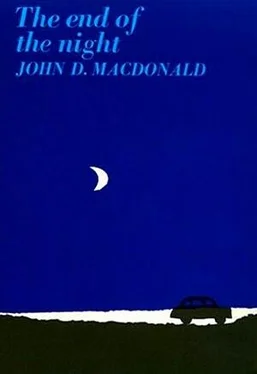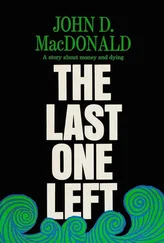“In this day and age? Because we’ve got plastics and television and tailfins and charity drives? Human nature doesn’t change, Mr. Kemp. There’ll always be animals around, walking on their hind legs, looking just like you and me. You could have gone your whole life understanding that. But now you’ve had your nose rubbed in it.”
The phone rang. Dunningan picked it up and put his palm over the mouthpiece. “All we can do is wait,” he said. “Try to get some sleep.”
As Kemp closed the door behind him, he heard Dunnigan say, “Too bad, George. That lead sounded good to me too.”
It was a hot weekend over most of the country, with no news of any special interest to compete with the Wolf Pack story. Routine drownings and traffic deaths and drab political announcements, national and international.
There had been mounting interest and coverage of the story prior to the Crown murder and the Wister kidnaping. The pump was primed. The Monroe violence had the proper ingredients — a slain, unsuccessful suitor, a wealthy and beautiful blonde abducted, a woman in slacks wielding a knife, a country road, eyewitnesses.
And so, suddenly, it was BIG. There was a lot of Page One space to fill. A lot of air time. A lot of television time. A lot of people aching to get into the act.
Any fool could look at a map of the country and trace a line from Uvalde to Tupelo to Nashville at Glasgow to Monroe. Tuesday through Saturday. And any fool could project that line into the densely populated Northeast and make a guess — as good as anybody’s — as to where they were going. Newspapers featured that map — and pictures of Helen Wister.
Look out for the Wolf Pack. Keep your eyes open. Look for the car.
In summer the crazies are in full bloom. Helen Wister was seen in Caribou, Maine, tied to a tree, being whipped by three burly men. A motorist, too frightened to stop, reported this. Helen Wister was seen in Miami, being forced, weeping, into a motel on the beach.
Three boys in Danville, Virginia, taking a short cut to a swimming hole, did find a dead blonde. But she was two weeks dead, and she had been half again as old as Helen Wister. It was a local problem.
Over thirty neurotic, semi-psychotic women presented themselves to police authorities across the country, claiming earnestly to be Helen Wister. The eldest was in her seventies. Once upon a time she had claimed to be Amelia Earhart.
The insane avalanche of false clues made the isolation and investigation of the potentially valid ones almost impossible. Hysterical types demanded police protection. Mystics and visionaries knew exactly where to find the Wolf Pack.
In the city of Monroe, all day Sunday, the idle boobs rode around in their cars, gawking. They gawked at Arnold Crown’s service station, and bought until the underground tanks were empty. A police guard kept them from turning into the driveway of the Wister house, or parking in front. They would park as close as permitted and get out and stare at the house. Some worked their way around to the lawn behind the house, trampling the flowers. A few parked and stared with endless, empty, idiot patience at Dallas Kemp’s office and living quarters. But by far the favorite spot was the place on Route 813 where Crown had been killed. Two accidents occurred, one serious, where you turned off the pike onto 813. They parked up and down the road for two hundred yards in both directions. They climbed up into the sagging barn and looked out. They took hay as souvenirs, and grease-streaked grass out of the ditch, and fist-sized stones. “Hey, Mary Jane, maybe this was one of the rocks they clunked him with, hey?”
Finally one too many climbed into the loft, The barn sighed and sagged, slowly at first, as the women went shrill with terror, and with a gentle rending sound and a thumping of timbers, it collapsed. A three-year-old named Walter James Lokey III was crushed to death. There was one broken back, eight broken legs, three broken arms, several less important fractures, and dozens of sprains, bruises and abrasions. Ambulances howled through the noonday heat. A police guard was posted to keep people away. But throughout the afternoon they kept coming and trying to steal splintered pieces of the barn.
At midnight on Sunday, Dr. Paul Wister sat alone in the kitchen of the silent house. His mind moved slowly, aimlessly, heavy with misery. He asked the eternal, unreasonable Why — and there could be no answer. He had given his wife sedation. He envied her the loss of awareness.
The kettle boiled. It boiled for some time before he became aware of it and got up and fixed himself the cup of instant coffee. Paul Wister did not look at all like the public conception of a fine surgeon. He was a big man, with a heavy torso, a large head, big reddish, chapped-looking hands. He moved ponderously, somewhat awkwardly. His eyes were a clear, impenetrable porcelain blue. He had a clipped way of speaking, a rusty, abrupt, shocking guffaw of a laugh. Those who did not know him thought they detected something comical about him, a Colonel Blimpishness, a slowness of mind. Those who knew him well — and there were very few — knew of the sensitivity and the dedication and the subtle, ranging mind. They knew that the pseudo-military brusqueness was his wall against a trivial world. He had to be a strong and tireless man to be able — for example — to work steadily for eight hours, repairing all the miraculous intricacies of a human hand, making it useful again, something that could hold, grasp and turn. He was a devout man, respecting the living materials that yielded to his skills. The big red hands, clumsy with cups and keys and neckties, were steady and quick and certain under the bright, hot lights of the operating room. His hobbies — for which he had too little time — illustrated the textures of his mind. He collected jade, and his knowledge of it was encyclopedic. This had led him into a study of the history of China and the Chinese peoples. He had learned the twenty thousand basic, symbolic ideographs of the printing style, used from the third century until the Communist revision of the language in 1956, and he had translated early poetry into English, two volumes of which had been published by a university press under a nom de plume. And he had kept abreast of the literature and technical advances in his profession. His energies were vast.
He sat in the kitchen of his home and thought about his daughter. He was a realist, a man of sentiment without sentimentality. He saw how easy it was to abuse himself for not giving her more of his time, yet it would have been artificial and unsatisfying to have done so. The relationship had been loving and good. He knew that genetically and emotionally they had had good luck with her, and he knew that luck is a factor with children. The twin boys were going to present far more serious problems.
Yet, realist that he was, he could not completely ignore the superstitious feeling that in some way he was at fault. This was his small ship, and he was captain, and someone had been lost, so it was his fault. Paul Wister knew that life is an almost excessively random affair. Health and love and safety are not earned. They are not rewards for behavior. They are part of the luck that you have or you don’t have. When you have it, in your blind human innocence you think you have earned it. And when it is gone, you feel you have offended your gods.
He sipped the steaming coffee and he thought of the things that had happened to others — so abrupt, so cruel, so meaningless. The Stallings family. Ard Stallings had been head of surgery at Monroe General. A lovely wife named Bess. Two teen-age children, a boy and a girl, bright and popular. For them it was as though a wall had suddenly been breached, releasing disaster. Ard had been walking in the woods with Bess. A stray bullet, never traced, had struck his right hand at a devilish angle, inflicting maximum damage. Paul Wister had operated three time, nerve grafts, muscle transplants. But he could not put the cleverness back. That had been the beginning. The boy was driving back from a dance with his date. A truck driver fell asleep. The boy and his date were killed. The truck driver suffered a sprained wrist and superficial lacerations. Bess had a cervical biopsy, a diagnosis of malignancy. Radical surgery was too late. It had spread. The only good thing about it was its speed. She died in a hard, dirty way, but it was quicker than most. Father and daughter went away. They were fleeing from disaster, but it was their appointment in Samarra. Their turismo left the highway in the mountains east of Mexico City. Ard Stallings was thrown clear. The girl died with the other passengers. Three months later, in the basement of the house in Monroe which was listed with the real-estate people, Ard injected himself with a lethal dose of morphine. He left no note. There was no one to leave a note for. From the time the bullet struck his hand until the night of his suicide, it was only thirteen months. It was as though there had been a magic circle around them, protecting them. And when the bullet struck, the circle was gone, and the blackness came in upon them. They were gone as though they had never existed. People clucked and shook their heads. Terrible bad luck for those folks.
Читать дальше







![Джон Макдональд - The Hunted [Short Story]](/books/433679/dzhon-makdonald-the-hunted-short-story-thumb.webp)


